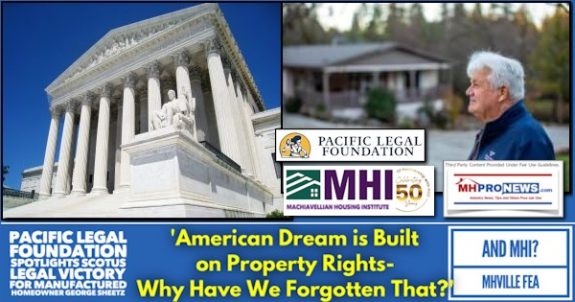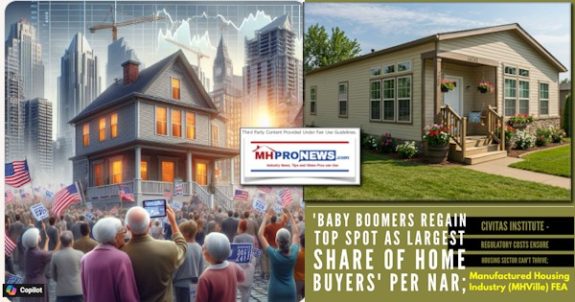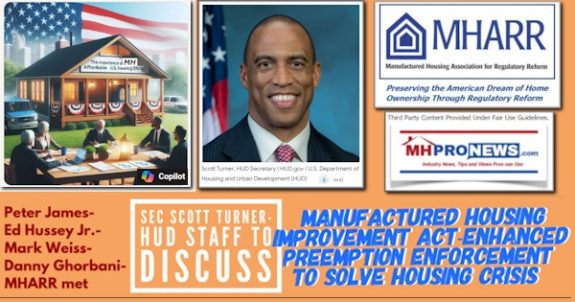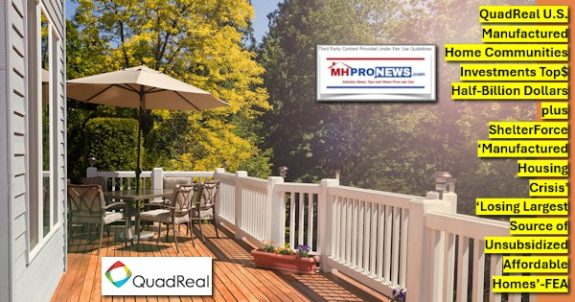On March 16, Senate Banking Committee Chairman Tim Johnson (D-SD) and Ranking Member Mike Crapo (R-ID) released the legislative text to their GSE reform plan, which had been announced several days earlier on March 11.
As advocated for by MHI, the legislative draft released by the Committee includes language that would provide manufactured home loans secured by personal property with key access to a newly envisioned secondary market mechanism.
As noted in a committee press release, the measure uses legislation (S. 1217) that had been introduced last year by Sens. Mark Warner (D-VA) and Bob Corker (R-TN) as a baseline. The bill would wind down Fannie Mae and Freddie Mac and replace them with a new Federal Mortgage Insurance Company (FMIC) that would be modeled after the Federal Deposit Insurance Corporation (FDIC).
FMIC would be responsible for collecting insurance premiums on mortgages securitized through the agency and would mandate 10 percent private capital upfront for those utilizing FMIC’s standardized securitization platform. First losses on mortgages would be absorbed through FMIC’s insurance fund, which would be funded by this private capital. There would be a government guarantee in the event of catastrophic losses.
Eligibility to access FMIC would be loans conforming to specific underwriting criteria that mimic the CFPB’s Qualified Mortgage standard.
MHI was able to ensure that personal property loans were able to fully participate in FMIC at the same level as real estate-secured loans. Eligible loans that could be securitized under FMIC would include “loans secured by manufactured homes” as well as “residential real estate” loans. The committee draft adopts a broad definition of residential real estate loans that would include a “personal property loan secured solely by the dwelling itself” and “hybrid land-home loan for a manufactured home.”
The legislation would eliminate the GSE’s affordable housing goals and duty to serve requirements and replace them with a series of incentive funds that would focus on providing affordable housing and would offer reduced insurance rates to providers of affordable housing securitizing through FMIC.
The bill establishes a Office of Consumer and Market Access, which would administer a new Market Access Fund to address the home ownership and rental housing needs of low- and moderate-income, and underserved or hard-to-serve populations. As advocated for by MHI, this would include“providing grants and loans, including through the use of pilot programs of sufficient scale, to support the research and development of sustainable homeownership and affordable rental programs, which programs shall include manufactured homes purchased through real estate and personal property loans and manufactured homes used as rental housing.“ The Market Access Fund will also be tasked with providing “credit enhancement, and other forms of credit support, for product and services that—will increase the rate of sustainable homeownership and affordable rental housing…including manufactured homes purchased through real estate and personal property loans and manufactured homes used as rental housing.”
The committee bill is considered a working draft and is a preliminary version of legislation, which is expected to be altered considerably over the coming weeks. While committee leaders hope to mark up the bill by Easter, there are still a number of revisions to be made and ample opportunity to strengthen securitization resources for manufactured housing remain. In addition, it is unclear as to the level of support that exists for the measure among Senate Banking Committee members.
Over the past several months, MHI staff has been working with Senate Banking Committee staff to include provisions that would provide manufactured home loans unfettered access to any reinvented secondary market mechanism. MHI will continue to working with the Senate Banking Committee to strengthen the provisions of the bill for manufactured housing.
As outlined in the committee’s news release, the legislation would:
· Start with S.1217 (Corker-Warner bill) as the base text and generally maintain its structure
· Wind down and eliminate Fannie Mae and Freddie Mac
· Promote a smooth and stable transition from the old system to the new system by providing specific benchmarks and timelines to guide Federal Mortgage Insurance Corporation (FMIC) and market participants
· Transfer appropriate functions to the modernized, streamlined and accountable FMIC, modeled in part after the FDIC including its regulatory authority
· Mandate 10 percent private capital, up front, and create a mortgage insurance fund for the system to protect taxpayers against future bailouts
· Create a member-owned securitization platform that will issue a single, standardized FMIC-wrapped security, and permit private label securities to be issued in a manner that encourages standardization and improved market liquidity
· Establish a mutual cooperative jointly owned by small lenders to ensure institutions of all sizes have direct access to the secondary market so community banks and credit unions are not at the mercy of their larger competitors when Fannie Mae and Freddie Mac are dissolved. The small lender mutual cooperative would provide a cash window for individual eligible loans, and small lenders could retain servicing rights
· Provide clear rules of the road for servicers that choose to participate in the FMIC system.
· Maintain a vibrant multifamily market by building upon successful risk-sharing mechanisms and products and providing access to a broad range of markets
· Require strong underwriting standards that mirror the definition of “qualified mortgage”, and set down payment requirement at five percent (with a short phase-in) except for first-time homebuyers at 3.5 percent
· Facilitate the broad availability of credit for eligible single-family and multifamily borrowers, monitor consumer and market access to credit, and provide market based incentives and transparency to serve underserved areas
· Eliminate affordable housing goals and establish transparent and accountable housing-related funds that would focus on ensuring there is sufficient decent housing available. The funds are NOT paid for with tax dollars, but through a small FMIC user fee (10 basis points) that only those who choose to use the system pay
· Allow current conforming loan limits to be maintained so that mortgage credit continues to be available in high cost areas.
· Maintain broad liquidity in the To-Be-Announced (TBA) market and direct FMIC to take into account the impact of new products on the TBA market
MHI will continue in its role as the leading advocate for the manufactured housing industry to ensure that manufactured home finance opportunities are expended to the greatest extent possible in forthcoming housing finance reform measures.
MHI will be conducting a more thorough and detailed analysis of the proposal in days to come. For more information, contact MHI Senior Vice President of Government Affairs Jason Boehlert at 703.558.0660 orjboehlert@mfghome.org.

























